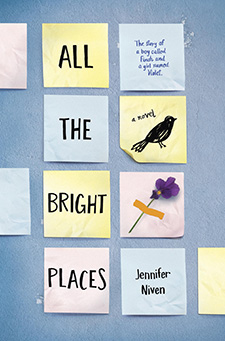
I recently read a book called All The Bright Places by Jennifer Niven. It is the story of a girl who learns to live her days instead of counting them down from a boy who wants to die.
The story is nice. The kind of nice you feel when you look around a coffee shop and see the inspiration for why a writer may have chosen to write about that coffee shop looking just like this or sounding just like that. The kind of nice you feel when you see you are working towards something you aspire to be. Especially the kind of nice you feel when you read a book that makes you feel fuzzy and philosophical and generally in love with the scenery and the people and the atmosphere surrounding you – you feel as if this writing has helped you see what the writer may have. The grass looks greener, to put it simply. And you love it. Or, maybe, rather, the wording is nice. But with every book that the wording makes you feel lovely and warm and content, there is a twist, and a sad ending.
The plot sounds relatively simple. “A girl who learns to live from a boy who yearns to die.” Oh, you think, they’ll probably fall in love, too. They do. And it’s very bittersweet. The two of them are assigned a project, it sounds cliché, and it absolutely is, but it becomes a very lovable scenario. Our two main characters, Violet and Finch, are both huge lovers of words, stories, books, writing, brainstorming and general writing and words. The chapter titles are something I penned down as creative. They aren’t called actual chapter names, which is fine, but what I liked about it was it’s simplicity. Each chapter was either labelled “Violet” or “Finch” with a short sentence underneath it, such as: “135 days until graduation.” or “Day 6.” or “How to survive quicksand.”
The book itself is immaculately representative,which is fantastic. We find out Finch could potentially be – watch out, spoilers – bipolar. I’ve yet to read another book where one main character has bipolar disorder. Things like mental illnesses aren’t exactly mentioned in many books, or at least not that I’ve read. And quite frankly, that sucks. I believe representation, of many things, is important. Gay characters, bisexual characters, pansexual, asexual, transgender, transsexual, those with mental illnesses, those with disabilities, genderqueer people, nonbinary people, intersex people, aromantic people, and demisexual people should all be represented in as many ways as they can. Books, movies, TV shows, comics, anything – anything. I like to think that with every book that has representation is a step closer to something bigger, and this being the first book I’ve read with a character with a mental illness, I think that is one huge step.
Even in the back of the book, where the author’s notes sit, there are a list of numbers and helplines for places all over the world so the author really gets the point across. You are not alone. (I have read one other book with something like this similar in the author’s notes. A book called Beautiful Music for Ugly Children, where the main character is trans – female to male – and in the author’s notes there is a section on what the author calls the “transgender umbrella”. She talks of all different types of gender identities, and with every book like these I read, I realise we are a little more away from blue and pink, and a little closer to a full colour spectrum.)
The book itself, while yes, it was sad, and yes it was bittersweet and heartbreaking and emotional, it was also light and humourous. Our main character, Finch, is what most people on sight would label a ‘weirdo’, and since this particular novel happens to be set in a high school, well, you can see why it feels a lot harsher. However, Finch is comedic and light hearted and sarcastic. It seems to lift the novel’s atmosphere up as you read. The plot is full of exploration of sites in Violet and Finch’s state. The way the author describes the scenery and the way Violet and Finch interpret them makes you want to slap on your shoes at 3am and go for a walk so you can see the world the way these two might have, even if it’s only a sliver of their world you glimpse. It makes you want to sit up on your windowsill with your feet dangling over the edge so you can see the view from a fresh perspective which is a lot higher up than your usual one.
My favourite character would have to be Finch. He is witty and sarcastic yet sad and questioning and insightful. He is a bundle of adjectives that I took a shine to, and he is a bundle of adjectives that I relate to.
For notes here, I wrote: “Recommend it – why would you?” and honestly, why wouldn’t I? The book is sad and funny, bittersweet and heartwarming, and definitely one to make you cry. The characters are well-rounded and lovable, complicated and realistic, and possibly the best ones I have ever read about. If you, like me, are one for tears and laughter and that comfortable philosophical feeling tingling from your toes all the way up, I absolutely recommend this book to you.
Get The Chance has a firm but friendly comments policy.
